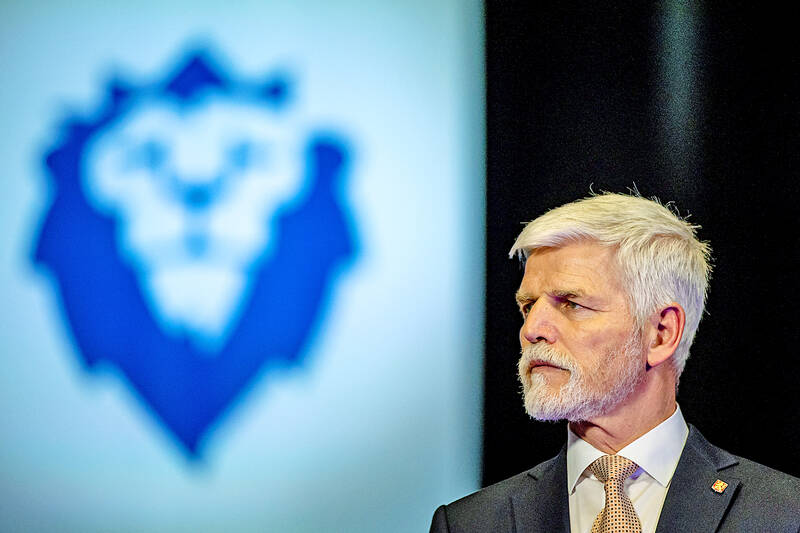Czech president-elect Petr Pavel on Tuesday defended his decision to have a telephone conversation with President Tsai Ing-wen (蔡英文) a day earlier despite objections from China, saying that the Czech Republic is a sovereign state and “we do what we think is right.”
In a Czech-language post on Twitter, Pavel wrote that he understood China had “reservations” about the phone call.
“However, we are a sovereign country and we do what we think is right,” he added.

Photo: EPA-EFE
Pavel, a retired general and former chairman of NATO’s military committee, the alliance’s highest military body, swept to the Czech presidency after a landslide victory on Saturday over former Czech prime minister Andrej Babis.
He is to replace Czech President Milos Zeman, whose second term ends next month.
Unlike Zeman, who pushed for closer relations with China and Russia, Pavel is considered a mainstream pro-Western candidate who backs aid for Ukraine.
The previous time Tsai publicly announced a phone call with a leader of a nation that does not have formal diplomatic ties with Taiwan was on Dec. 2, 2016, with then-US president-elect Donald Trump.
Pavel’s post on Twitter was made after Beijing on Tuesday condemned Prague over the Tsai-Pavel call.
“Czech president-elect Pavel ignored China’s repeated attempts to dissuade him and our repeated representations,” Chinese Ministry of Foreign Affairs spokeswoman Mao Ning (毛寧) told reporters.
“He has persisted in stepping on China’s red line, seriously interfering in China’s domestic affairs and hurting the feelings of the Chinese people,” Mao said.
“Before his election, Pavel publicly stated that the ‘one China’ principle should be respected, yet now he has gone back on his words,” she said. “China once again urges the Czech Republic to ... take immediate and effective measures to eliminate the negative impact of this incident and avoid irreparable damage to China-Czech relations.”
Meanwhile, Czech Prime Minister Petr Fiala on Tuesday said the Czech Republic maintains its “one China” policy, despite having good relations with Taiwan.
“Czechia respects and holds its own one-China policy,” Fiala said in a statement. “As a sovereign country we decide ourselves who we have calls with and who we will meet.”
The president of the Czech Republic is the head of state, but has mostly ceremonial powers, with the day-to-day business of the executive government carried out by the prime minister.
In related news, EU spokeswoman for foreign affairs and security policy Nabila Massrali on Tuesday reiterated the bloc’s stance on Taiwan and China.
“The EU and its member states remain committed to the long-standing ‘one China’ policy, which constitutes the framework for the EU’s and its member states’ engagement with Taiwan,” Massrali told a news briefing.
“Within this policy, the EU and its member states recognize the government of the People’s Republic of China as the sole government of China,” she said. “At the same time the EU and its member states have strong ties with Taiwan, an important economic and high-tech partner in the region.”

AGING: As of last month, people aged 65 or older accounted for 20.06 percent of the total population and the number of couples who got married fell by 18,685 from 2024 Taiwan has surpassed South Korea as the country least willing to have children, with an annual crude birthrate of 4.62 per 1,000 people, Ministry of the Interior data showed yesterday. The nation was previously ranked the second-lowest country in terms of total fertility rate, or the average number of children a woman has in her lifetime. However, South Korea’s fertility rate began to recover from 2023, with total fertility rate rising from 0.72 and estimated to reach 0.82 to 0.85 by last year, and the crude birthrate projected at 6.7 per 1,000 people. Japan’s crude birthrate was projected to fall below six,

Conflict with Taiwan could leave China with “massive economic disruption, catastrophic military losses, significant social unrest, and devastating sanctions,” a US think tank said in a report released on Monday. The German Marshall Fund released a report titled If China Attacks Taiwan: The Consequences for China of “Minor Conflict” and “Major War” Scenarios. The report details the “massive” economic, military, social and international costs to China in the event of a minor conflict or major war with Taiwan, estimating that the Chinese People’s Liberation Army (PLA) could sustain losses of more than half of its active-duty ground forces, including 100,000 troops. Understanding Chinese

US President Donald Trump in an interview with the New York Times published on Thursday said that “it’s up to” Chinese President Xi Jinping (習近平) what China does on Taiwan, but that he would be “very unhappy” with a change in the “status quo.” “He [Xi] considers it to be a part of China, and that’s up to him what he’s going to be doing, but I’ve expressed to him that I would be very unhappy if he did that, and I don’t think he’ll do that. I hope he doesn’t do that,” Trump said. Trump made the comments in the context

SELF-DEFENSE: Tokyo has accelerated its spending goal and its defense minister said the nation needs to discuss whether it should develop nuclear-powered submarines China is ramping up objections to what it sees as Japan’s desire to acquire nuclear weapons, despite Tokyo’s longstanding renunciation of such arms, deepening another fissure in the two neighbors’ increasingly tense ties. In what appears to be a concerted effort, China’s foreign and defense ministries issued statements on Thursday condemning alleged remilitarism efforts by Tokyo. The remarks came as two of the country’s top think tanks jointly issued a 29-page report framing actions by “right-wing forces” in Japan as posing a “serious threat” to world peace. While that report did not define “right-wing forces,” the Chinese Ministry of Foreign Affairs was